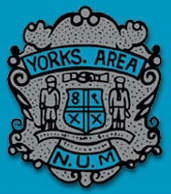History
The union was founded in 1881 with the merger of the South Yorkshire Miners' Association, and the West Yorkshire Miners' Association, agreed only because both organisations were weakened by unsuccessful disputes. In order to save money, it moved away from its predecessors' focus on paying benefits to members who were unable to work, and instead aimed to improve working conditions. [3] This proved immediately successful, as the union obtained a 10% rise in wages in 1882, and membership grew to over 20,000. [4]
In 1994, the union's members were transferred to the national body, the NUM. [5]
This page is based on this
Wikipedia article Text is available under the
CC BY-SA 4.0 license; additional terms may apply.
Images, videos and audio are available under their respective licenses.

